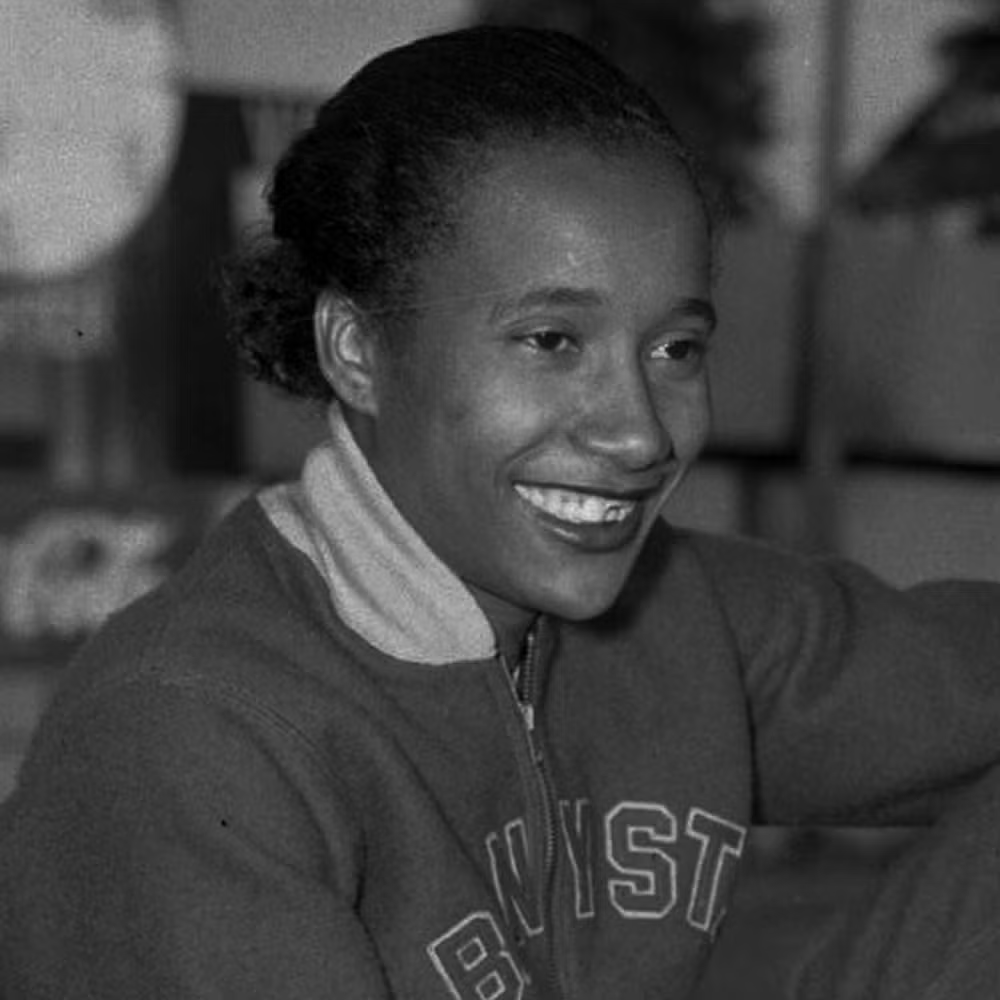
Table of Contents
Who Was Alice Coachman?
Alice Coachman made history at the 1948 London Olympics by becoming the first Black woman to win an Olympic gold medal. She achieved this remarkable feat by clearing a record-breaking height of 5 feet, 6 and 1/8 inches in the high jump finals. Following her athletic career, she continued to contribute to the sports community by establishing the Alice Coachman Track and Field Foundation, which supports young athletes as well as retired Olympic veterans.
Early Years
Born on November 9, 1923, in Albany, Georgia, Alice Coachman grew up in the segregated South, where opportunities to participate in organized sports were often denied to African Americans, particularly women. Despite these barriers, Coachman improvised her training, running barefoot on dirt roads and practicing with makeshift equipment to hone her high jump technique.
While attending Madison High School, Coachman caught the attention of Harry E. Lash, the boys’ track coach, who recognized her talent and became her mentor. Her exceptional ability soon drew the interest of Tuskegee Institute in Alabama, which awarded her a scholarship at the age of 16 in 1939. Her parents, initially hesitant about her pursuing athletics, eventually supported her decision to enroll. Even before attending her first class at Tuskegee, Coachman set high school and college records in the high jump, winning the Amateur Athletic Union (AAU) national championship while competing barefoot.
Rise to Prominence
Throughout the following years, Coachman dominated AAU competitions. By 1946, the same year she enrolled at Albany State College, she held national titles in the 50- and 100-meter races, the 400-meter relay, and the high jump. However, these years were bittersweet for Coachman, as the outbreak of World War II led to the cancellation of the 1940 and 1944 Olympic Games, denying her the chance to compete on the world stage during the prime of her athletic career. Despite these challenges, her perseverance and talent ultimately led her to Olympic glory in 1948.
Olympic Triumph
In 1948, Alice Coachman finally had the opportunity to showcase her extraordinary talent on the global stage when she represented the United States at the London Olympics. Despite suffering from a back injury, Coachman achieved a historic feat in the high jump, setting a new Olympic record with a leap of 5 feet, 6 1/8 inches. This remarkable achievement made her the first Black woman to win an Olympic gold medal. The prestigious honor was presented to her by King George VI, father of Queen Elizabeth II.
Reflecting on her victory, Coachman later remarked, “I didn’t know I’d won. I was on my way to receive the medal when I saw my name on the board. And, of course, I glanced over into the stands where my coach was, and she was clapping her hands.”
Post-Olympic Life of Alice Coachman
After her historic victory at the 1948 Olympic Games, Alice Coachman returned to the United States and completed her degree at Albany State College. Though she retired from competitive athletics, her influence continued to grow. In 1952, she broke new ground as the first African American woman to secure a major endorsement deal, becoming a spokesperson for Coca-Cola.
Coachman’s dedication to supporting athletes extended beyond her competitive years. She founded the Alice Coachman Track and Field Foundation, which provides guidance and financial assistance to up-and-coming athletes as well as retired Olympic veterans.
Coachman’s legacy has endured for decades. In 1996, she was honored at the Atlanta Summer Olympics as one of the 100 greatest Olympians in history. Her remarkable career has earned her induction into nine halls of fame, including the National Track & Field Hall of Fame (1975) and the U.S. Olympic Hall of Fame (2004), solidifying her place as a trailblazer in sports history.
Death
Alice Coachman passed away on July 14, 2014, at the age of 90 in Georgia. In the months leading up to her death, she had been residing in a nursing home following a stroke. Coachman is survived by her two children from her first marriage. Her second husband, Frank Davis, had predeceased her.
